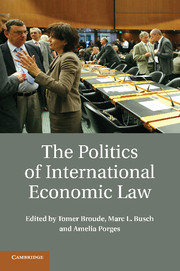Book contents
- Frontmatter
- Contents
- Contributor List
- Acknowledgments
- 1 Introduction
- Part I The Politics of Law Making in International Trade
- Part II The Politics of International Investment Treaty Making
- 6 The Politics of the European Union's Investment Treaty Making
- 7 The Politics of China's Investment Treaty-Making Program
- 8 The Politics of South–South Bilateral Investment Treaties
- Part III The Politics of Sovereign Wealth and International Financial Law
- Part IV The Politics of Dispute Settlement in International Economic Law
- Part V Linkages between International Economic Law and Foreign Policy
- Index
8 - The Politics of South–South Bilateral Investment Treaties
Published online by Cambridge University Press: 03 May 2011
- Frontmatter
- Contents
- Contributor List
- Acknowledgments
- 1 Introduction
- Part I The Politics of Law Making in International Trade
- Part II The Politics of International Investment Treaty Making
- 6 The Politics of the European Union's Investment Treaty Making
- 7 The Politics of China's Investment Treaty-Making Program
- 8 The Politics of South–South Bilateral Investment Treaties
- Part III The Politics of Sovereign Wealth and International Financial Law
- Part IV The Politics of Dispute Settlement in International Economic Law
- Part V Linkages between International Economic Law and Foreign Policy
- Index
Summary
INTRODUCTION
Bilateral investment treaties (BITs) were originally intended as legal instruments to promote and protect investments by rich capital-exporting states in the developing world. Although BITs signed between developing countries (hereinafter South–South BITs) did begin to emerge from the mid-1960s with the 1964 Kuwait–Iraq BIT, the typical BIT was, until recently, negotiated between a developed and a developing country (hereinafter North–South BITs). Accompanied by rising outward foreign direct investment (FDI) stocks from developing countries, however, this pattern has begun to change, as many developing countries have increasingly entered into BITs among themselves. South–South BITs today account for around 40 percent of the global network of BITs, and more than 100 developing countries have entered into BITs with other developing countries. Most have been signed within the same region, and many recent South–South BITs have been facilitated at minilateral conferences organized by the United Nations Conference on Trade and Development (UNCTAD), often sponsored by capital-exporting countries, such as Germany, Switzerland, or France.
Given the initial purpose of BITs, this development in the international investment regime is notable and raises a number of questions. Does the popularity of South–South BITs imply that after decades of resistance, developing countries have finally converged completely to the norms of the developed world with respect to foreign investment treatment and protection standards? If true, that could give proponents of a multilateral investment treaty a strong political argument, for if developing countries consistently incorporate “traditional” North–South BIT standards even into South–South BITs, there is no apparent reason that they should refuse to incorporate similar standards in a multilateral framework.
- Type
- Chapter
- Information
- The Politics of International Economic Law , pp. 186 - 208Publisher: Cambridge University PressPrint publication year: 2011
- 5
- Cited by

